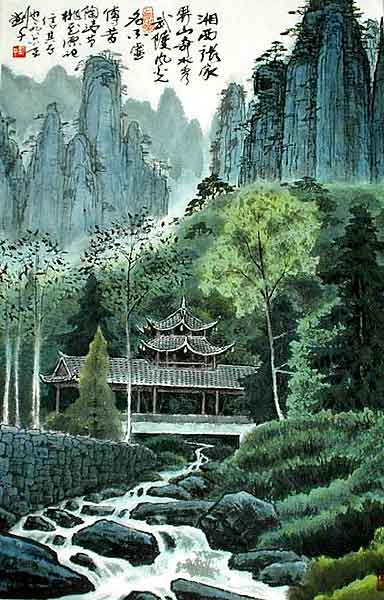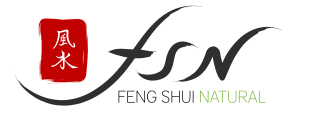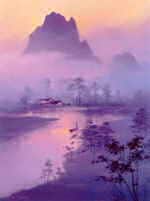
The ancient Chinese art of feng shui literally translated as "wind and water" is becoming more known throughout the world, especially as people perceive that their environment can be a source of resources where to care and improve their lives.
Chinese geomancy is applied to architecture, interior decoration, interior design, the construction of gardens, water features and even urban planning. Many of the feng shui characteristics are based on logical and aesthetical principles where the common sense and the pursuit of beauty are very important, and there are also other variables that use time cycles or the magnetic lines of the earth.
Feng shui consultants generally apply this art to improve health, the income, the ability to study or to find better relationships whether personal or for business, etc.. For the wise Taoists feng shui has its own framework for action, which falls within what is called “luck of the earth”, that is to say the influence of the environment on people's lives. Besides to this influence it is taken into account what they call the Qi of heaven (innate characteristics from birth) and the Qi of man (his effort, dedication and personal determination). As you can see the Qi of the earth is a factor that interferes with others but not a final and absolute fact, feng shui therefore be seen as a relationship or help to other factors, not as a panacea to remedy in the form magic all our problems. The Chinese call these factors the three lots, calling Ren Chai man's fate, luck Tien Chai to Chai Ti sky and the fate of the earth.
As you can see the Qi of the earth is a factor that interferes with others but is not a final and absolute fact, feng shui therefore has to be seen as an exchange or help to other factors, not as a panacea that in a magical form remedies all our problems. The Chinese call these factors the three lucks, calling Ren Chai the man's fate,Tien Chai heaven's fate and Ti Chai earth's fate.
On the lines below there are some ideas commented about issues that we can consider when we first approach to this art, feng shui as any other branch of knowledge is subjected to various practices, some more successful than others. Without going into too many technicalities, we can here compile some comments on its current practice.
Feng shui is a very ancient art and its practices profound. Some people confuse the principles with rituals or superstitions peculiar to Chinese culture or an oriental decoration, others take commercially advantage to sell all kinds of fetishes and strange items, not necessarily useful for its practice. Finding a home packed with red tassels, Chinese coins, mandarin ducks, cristals or other objects does not always mean having good feng shui.
Although it is true that in feng shui one can make use of certain items such as fountains, certain natural elements and other objects its practice can not be just reduced to buy objects to fix various problems, in general the most important principles are associated with the physical distribution, the energy course, the magnetic orientation, use and activity of the rooms and that what we call time factor.
A good practitioner of this art could recommend the construction of a housing at a given time, choose a healthy physical area, orient the view and front door to a specific magnetic direction, advising on an internal level the best location of corridors, doors and windows and also decide the colors, materials and most appropriate elements for each room of the house and its inhabitants. All this may go unnoticed for an external observer who looks for very "concrete" elements or objects, the true feng shui should be known more for its effects than by its external appearance, although there are facts about the "forms" that are analyzed visually.
Feng shui is nourished mostly by its roots from concepts used in Chinese philosophy as the word Qi o Chi synonymous with energy. Feng shui is synthesized in promoting the circulation of what we usually call Sheng Qi (positive energy) or against the concept Sha Qi that refers to sick energy. It also explores the balance between yin and yang ( the opposite energetic poles), the correct distribution of the 5 elements (fire, earth, metal, water and wood), the influence of the 8 directions and their trigrams, the earthly branches and heavenly trunks, and so on. These principles apply to Chinese medicine, Qi Gong, Tai Chi, martial arts and to Chinese knowledge in general.
If you wish to make a feng shui study, the consultant should at least use a precision compass to locate the directions of your space, calculate the most favourable building and/or renovation periods, ask about the date of birth of the residents, observe carefully the internal and external forms of the place and thereby develop a geomantic chart that should include observations on the evolution in time of the space and the advice for a better balance. In the actual modern life it is recommended that a feng shui study encloses the observation of possible problems with electromagnetic contamination, materials and readings of the alteration in the subsoil. Ultimately, the feng shui consultant has to observe any element in the environment that is relevant to the real improvement of your environment or workplace.
As a final thing consider when applying feng shui principles such as order, cleanliness and vitality that comes from your environment, remember that feng shui includes in its most essential points the search for beauty.

